外研版(2019)选择性必修 第四册Unit 6 Space and beyond Using language课件(共30张)
文档属性
| 名称 | 外研版(2019)选择性必修 第四册Unit 6 Space and beyond Using language课件(共30张) |  | |
| 格式 | pptx | ||
| 文件大小 | 827.4KB | ||
| 资源类型 | 教案 | ||
| 版本资源 | 外研版(2019) | ||
| 科目 | 英语 | ||
| 更新时间 | 2024-11-17 10:15:50 | ||
图片预览

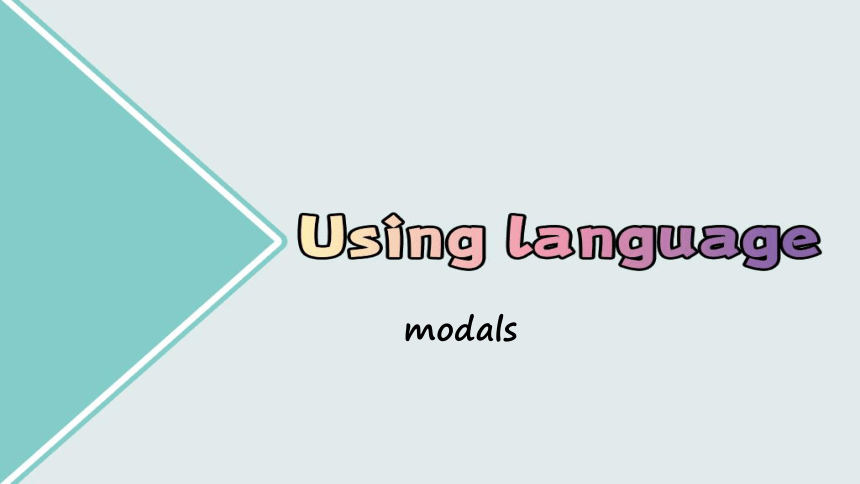
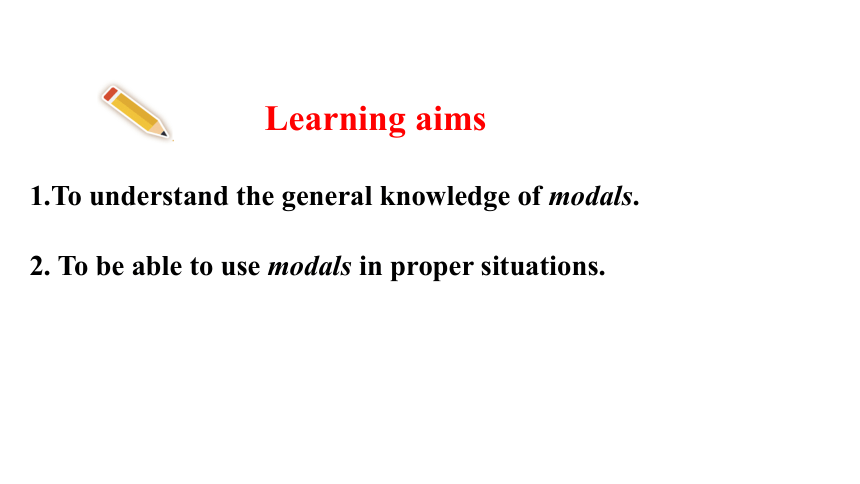
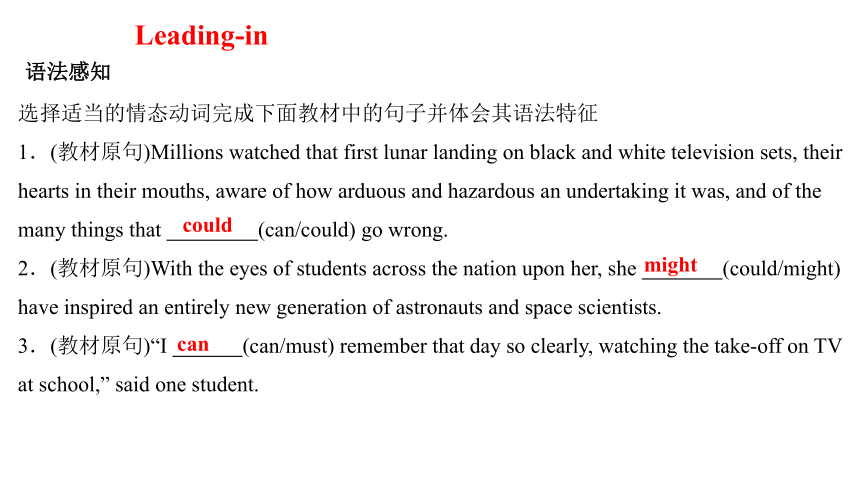
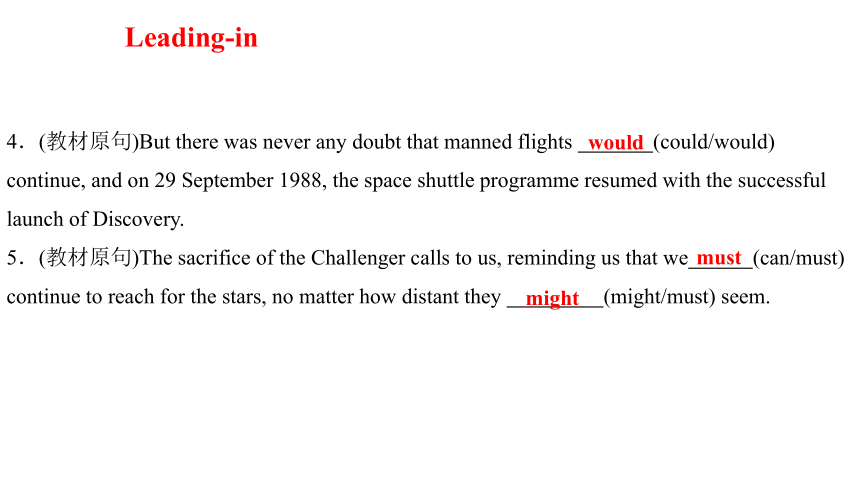
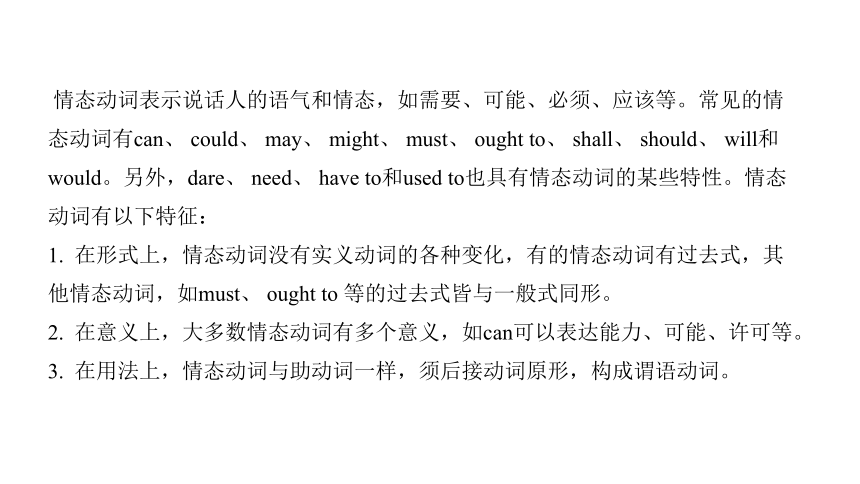

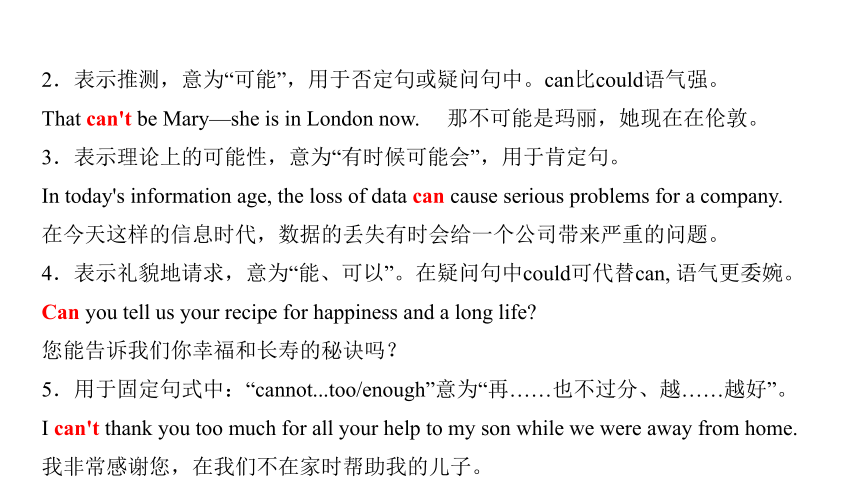
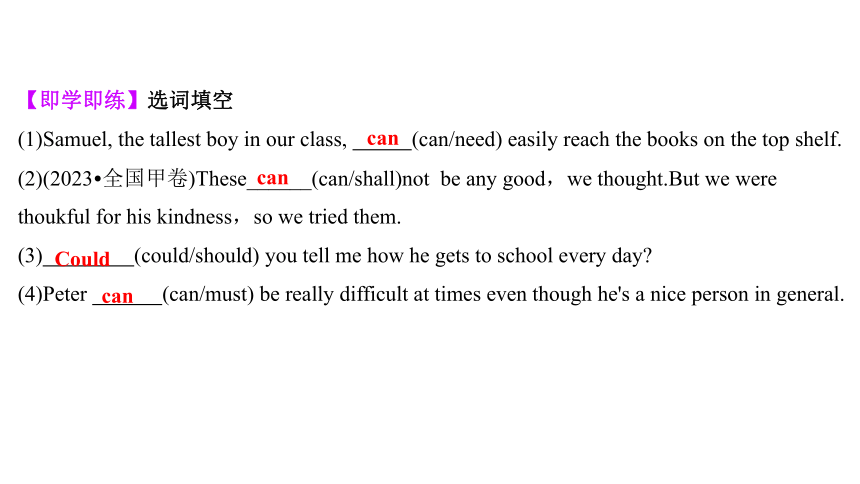


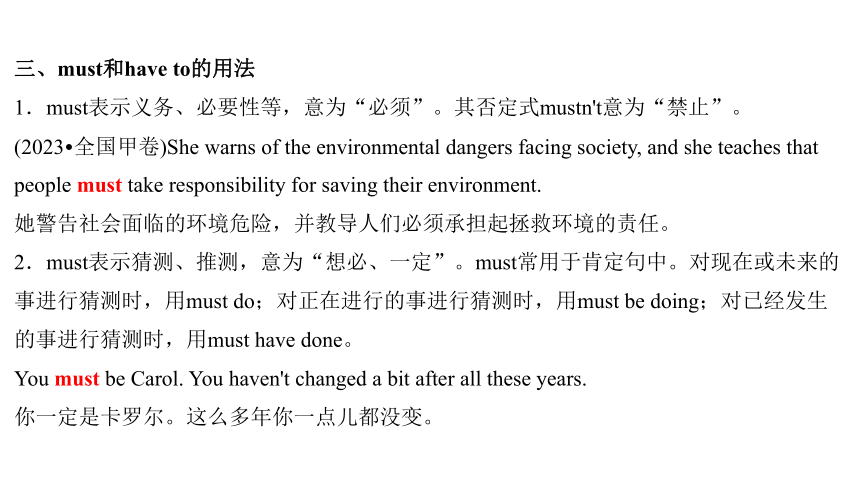
文档简介
(共30张PPT)
Space and beyond
modals
1.To understand the general knowledge of modals.
2. To be able to use modals in proper situations.
Learning aims
语法感知
选择适当的情态动词完成下面教材中的句子并体会其语法特征
1.(教材原句)Millions watched that first lunar landing on black and white television sets, their hearts in their mouths, aware of how arduous and hazardous an undertaking it was, and of the many things that (can/could) go wrong.
2.(教材原句)With the eyes of students across the nation upon her, she (could/might) have inspired an entirely new generation of astronauts and space scientists.
3.(教材原句)“I (can/must) remember that day so clearly, watching the take off on TV at school,” said one student.
Leading-in
could
can
might
4.(教材原句)But there was never any doubt that manned flights (could/would) continue, and on 29 September 1988, the space shuttle programme resumed with the successful launch of Discovery.
5.(教材原句)The sacrifice of the Challenger calls to us, reminding us that we (can/must) continue to reach for the stars, no matter how distant they (might/must) seem.
Leading-in
would
must
might
情态动词表示说话人的语气和情态,如需要、可能、必须、应该等。常见的情态动词有can、 could、 may、 might、 must、 ought to、 shall、 should、 will和would。另外,dare、 need、 have to和used to也具有情态动词的某些特性。情态动词有以下特征:
1. 在形式上,情态动词没有实义动词的各种变化,有的情态动词有过去式,其他情态动词,如must、 ought to 等的过去式皆与一般式同形。
2. 在意义上,大多数情态动词有多个意义,如can可以表达能力、可能、许可等。
3. 在用法上,情态动词与助动词一样,须后接动词原形,构成谓语动词。
一、can和could的用法
1.表示能力,意为“能、会”。
Jim says we can stay in his house as long as we leave it clean and tidy.
吉姆说只要我们保持房子干净整洁,我们就能待在他的房子里。
It was several minutes before I could take in what he was saying.
过了好几分钟,我才理解他说的是什么。
【温馨提示】
was/were able to sth.表示过去有能力做并且成功做了某事,相当于“manage to do sth./succeed in doing sth.”。
The fire spread through the hotel very quickly but everyone was able to get out.
尽管这场大火迅速蔓延了整个宾馆,但是每个人都逃了出来。
2.表示推测,意为“可能”,用于否定句或疑问句中。can比could语气强。
That can't be Mary—she is in London now. 那不可能是玛丽,她现在在伦敦。
3.表示理论上的可能性,意为“有时候可能会”,用于肯定句。
In today's information age, the loss of data can cause serious problems for a company.
在今天这样的信息时代,数据的丢失有时会给一个公司带来严重的问题。
4.表示礼貌地请求,意为“能、可以”。在疑问句中could可代替can, 语气更委婉。
Can you tell us your recipe for happiness and a long life
您能告诉我们你幸福和长寿的秘诀吗?
5.用于固定句式中:“cannot...too/enough”意为“再……也不过分、越……越好”。
I can't thank you too much for all your help to my son while we were away from home.
我非常感谢您,在我们不在家时帮助我的儿子。
【即学即练】选词填空
(1)Samuel, the tallest boy in our class, (can/need) easily reach the books on the top shelf.
(2)(2023 全国甲卷)These______(can/shall)not be any good,we thought.But we were thoukful for his kindness,so we tried them.
(3) (could/should) you tell me how he gets to school every day
(4)Peter (can/must) be really difficult at times even though he's a nice person in general.
can
can
Could
can
二、may和might的用法
1.表示许可、请求,在疑问句中might比may的语气更委婉。
Might/May I have a word with you It won't take long.
我可以和你说句话吗?不会耽误很长时间。
2.表示推测,意为“可能、或许”,通常用于肯定句和否定句中。
(2023 新高考Ⅱ卷)If you’re lucky, there might be a pocket park near where you live, but it’s unusual to find places in a city that are relatively wild.如果你幸运的话,你住的地方附近可能会有一个小型公园,但在城市里找到相对野生的地方是不寻常的。
3.用于固定句式:“may as well+动词原形”意为“最好、倒不如……”。
Since it is raining hard, you may as well stay here.
既然雨下得这么大,你倒不如待在这儿。
【即学即练】选词填空
(1)You (can/may) feel all the training a waste of time, but I'm a hundred percent sure later you'll be grateful you did it.
(2)Life is unpredictable. Even the poorest (must/might) become the richest.
may
might
三、must和have to的用法
1.must表示义务、必要性等,意为“必须”。其否定式mustn't意为“禁止”。
(2023 全国甲卷)She warns of the environmental dangers facing society, and she teaches that people must take responsibility for saving their environment.
她警告社会面临的环境危险,并教导人们必须承担起拯救环境的责任。
2.must表示猜测、推测,意为“想必、一定”。must常用于肯定句中。对现在或未来的事进行猜测时,用must do;对正在进行的事进行猜测时,用must be doing;对已经发生的事进行猜测时,用must have done。
You must be Carol. You haven't changed a bit after all these years.
你一定是卡罗尔。这么多年你一点儿都没变。
3.must表示偏执、固执,意为“非得、偏要”。
If you must go, at least wait until the storm is over.
如果你非要走,至少要等到暴风雨停了。
4.have to表示客观需要,意为“不得不、必须”,强调客观上的必要性。
You have to be back before 10:00 because the train leaves at 10:15.
你必须在10点之前回来,因为火车10点15离开。
【即学即练】完成句子
(1)法律规定人们喝酒之后禁止开车。
The law states that people after drinking alcohol.
(2)你没有必要买礼物,但你如果想买的话,也可以买。
You a gift, but you can if you want to.
(3)(2023 浙江1月高考)Then you ________________ walk through several cars on a moving train three times a day for your meals.
这样的话你就不需要在移动的火车上每天三次穿过车厢去就餐。
mustn’t drive
don’t have to buy
won’t have to
四、shall与should/ought to的用法
1.shall用于第一、第三人称疑问句中,表示说话人征求对方的意见或向对方请示。用于第二、第三人称陈述句中,表示说话人给对方的命令、警告、允诺或威胁。用在条约、规定、法令等文件中表示义务或规定,一般用于第三人称且用于陈述句中,意为“必须、应该”。
Shall I tell Brett to come over straight after school tomorrow
要我告诉布雷特明天放学以后直接过来吗?
One of our rules is that every student shall wear school uniform while at school.
我们有一条规定,那就是每名学生在校期间都必须穿校服。
2.should/ought to的用法。
(1)表示劝告、建议,意为“应该”。
I don't think you should/ought to give up the opportunity to go to university which you have been dreaming about.
我认为你不应该放弃你一直以来梦想的上大学的机会。
(2)表示推测、可能性或预期,意为“应该、可能”。
He should/ought to be here on time—he started early enough.
他应该可以按时到这里,他很早就出发了。
(3)should用于表示感情或意志等的that从句中,意为“竟然、居然”。
It's strange that he should have taken the books without the owner's permission.
简直是太奇怪了,他竟然未得到主人的允许就把这些书拿走了。
【即学即练】完成句子
(1)你明天可以拿到那本书。
You that book tomorrow.
(2)下次过马路时,你应该更小心些。
You when you cross the road next time.
(3)如果火车准点的话,她应该在7点钟到达北京。
If the train is on time, she by seven o'clock.
(4)如果你不来,我就不告诉你这个消息了。
If you can't come, I you the news.
shall have
ought to/should arrive in Beijing
shall not tell
ought to/should be more careful
五、will和would的用法
1.表示意志、意愿。will指现在,would指过去。
I have told him again and again to stop smoking, but he will not listen.
我已再三告诉他戒烟,但是他就是不听。
Days later, my brother called to say he was all right, but wouldn't say where he was.
几天后,我哥哥打电话说他一切都好,但不愿意说他在哪儿。
2.表示习惯性动作,意为“总是”。will指现在,would指过去。
I still remember my happy childhood when my mother would take me to Disneyland at weekends.我仍旧记得我快乐的童年,那时我妈妈总是在周末带我去迪士尼乐园。
3.表示征求意见、提出请求,多用于第二人称疑问句中。would比will语气委婉。
Will/Would you please let me have a look at your new watch 请问可以让我看看你的新表吗?
【即学即练】完成句子
(1)我的父母不会允许我在外面待到很晚。
My parents out late.
(2)他住在乡下时总是起得很早。
He when he lived in the country.
(3)你介意为我打开窗户吗?
the window for me
won’t allow me to stay
would get up early
Would you mind opening
六、used to的用法
used to表示“过去常常……”,没有人称和数的变化,仅用于过去时中,表示过去的习惯或过去某一时期的状况,但现在已不再这样了。
She doesn't get up early as she used to.
她不像以前起得那么早了。
【温馨提示】
would与used to的区别:
would仅表示过去习惯性或重复性的动作,没有与现在对比的含义;used to 表示过去经常发生的动作或存在的状态,现在已不再这样了。
七、need的用法
need作情态动词,表示必要性,常用于疑问句和否定句中,needn't表示“不必”。 作实义动词时,可用于肯定句、否定句和疑问句中,有人称、数和时态的变化,其后可接名词、代词、带to的不定式或现在分词作宾语。
My room is a mess, but I needn't clean it before I go out tonight. I can do it in the morning.
虽然我的房间乱糟糟的,不过我没必要今天晚上出门之前打扫,我可以明天上午再打扫。
Since you know it already, we don't need to keep it a secret.
既然你已经知道了,我们就没有必要保密了。
【即学即练】完成句子
(1)这是免费服务,你不必为此付钱。
This is free service; you .
(2)——我需要今天完成这项工作吗?
— today
——是的,你必须完成。
—Yes, .
needn’t pay for it
Need I finish the work
you must
八、dare的用法
dare作情态动词,意为“敢、敢于”,没有人称、数和时态的变化,主要用于疑问句、否定句和条件句中,后接动词原形。作实义动词时,在肯定句中通常接带to的不定式;在疑问句和否定句中,dare之后的不定式可省略。
How dare you talk to your parents like that 你怎么敢那样同你父母讲话?
Most people hate Harry but they don't dare to say so. 大多数人对哈利敢怒不敢言。
【即学即练】完成句子
她晚上敢一个人出去吗?
(1) at night
(2) at night
Dare she go out alone
Does she dare to go out alone
九、“情态动词+have done”的用法
对过去的推测 must have done 一定做过某事(肯定句)
can/could have done 过去可能做过……吗?(疑问句)
过去不可能做过……(否定句)
may/might have done 过去可能做过……吗?(疑问句)
过去可能做过……(肯定句)
过去可能没有做过……(否定句)
对过去情况的后悔、遗憾或责备 could have done 本来能够做但却未做(肯定句)
should have done 本来应该做但是实际上未做
shouldn't have done 本来不应该做而实际上做了
needn't have done 没必要做却做了
Jack described his father, who must have been a brave boy many years ago, as a strong willed man.
杰克把他的父亲描述成一个意志坚强的人,他认为多年前他的父亲一定是个勇敢的男孩。
George can't have gone too far. His coffee is still warm.
乔治不可能走得太远,因为他的咖啡还是热的呢。
—Sorry, Mum!I failed the job interview again.
——对不起,妈妈!我工作面试又失败了。
—Oh, it's too bad. You should have made full preparations.
——哦,太糟糕了。你本应该做好充分准备的。
【即学即练】用“情态动词+have done”完成句子
(1)You (本不应该责骂他) for his poor performance. After all, he had done his best.
(2)I can't find my purse. I (可能落在) it in the supermarket yesterday, but I'm not sure.
(3)I (本没有必要担忧) before I came to the new school, for my classmates here are very friendly to me.
(4)We (本可以参观) the museum but we spent too much time shopping.
(5)He (过去肯定是一名医生), for he knows medicines so well.
shouldn’t have scolded him
may/might have left
needn’t have worried
could have visited
must have been a doctor
Summary
Ⅰ.用适当的情态动词填空
1.—Has the book I want arrived yet I'll have to use it next week. The exam is coming.
—Don't worry. You have it by this Friday.
2.—I'm afraid I have to leave now, for you see, he is waiting for me.
—Well, if you , at least wait till the heavy rain stops.
3.When he was there, he go to that coffee shop at the corner after work every day.
4.She didn't get there in time. She might (miss) the bus.
shall
must
would
have missed
5.You have got better grades in the last examination, but you were so careless.
6.He be in his office now, but I'm not sure.
7.It was an easy test and he have passed, but he didn't.
8. you please send me a message when you see him
9.The train is to start soon and Mike hasn't arrived. What have happened to him
may/might
should
could
Will/Would
can/could
Ⅱ.完成句子
1.每次她遇到麻烦,她都会向他求助。
Every time she was in trouble, she .
2.你的作业必须在下课之前交上。
Your homework before the class is over.
3.我真的很后悔在该努力学习的时候浪费了太多时间。
I really regret wasting too much time when I .
4.我不知道她在哪里,她现在可能在图书馆。
I don’t know where she is; she now.
5.你本来能做得更好,但你当时太粗心了。
You , but you were too careless.
would turn to him for help
must be handed in
should have studied hard
could have done better
may be in the library
Pride hurts, modesty benefits.
满招损,谦受益。
Space and beyond
modals
1.To understand the general knowledge of modals.
2. To be able to use modals in proper situations.
Learning aims
语法感知
选择适当的情态动词完成下面教材中的句子并体会其语法特征
1.(教材原句)Millions watched that first lunar landing on black and white television sets, their hearts in their mouths, aware of how arduous and hazardous an undertaking it was, and of the many things that (can/could) go wrong.
2.(教材原句)With the eyes of students across the nation upon her, she (could/might) have inspired an entirely new generation of astronauts and space scientists.
3.(教材原句)“I (can/must) remember that day so clearly, watching the take off on TV at school,” said one student.
Leading-in
could
can
might
4.(教材原句)But there was never any doubt that manned flights (could/would) continue, and on 29 September 1988, the space shuttle programme resumed with the successful launch of Discovery.
5.(教材原句)The sacrifice of the Challenger calls to us, reminding us that we (can/must) continue to reach for the stars, no matter how distant they (might/must) seem.
Leading-in
would
must
might
情态动词表示说话人的语气和情态,如需要、可能、必须、应该等。常见的情态动词有can、 could、 may、 might、 must、 ought to、 shall、 should、 will和would。另外,dare、 need、 have to和used to也具有情态动词的某些特性。情态动词有以下特征:
1. 在形式上,情态动词没有实义动词的各种变化,有的情态动词有过去式,其他情态动词,如must、 ought to 等的过去式皆与一般式同形。
2. 在意义上,大多数情态动词有多个意义,如can可以表达能力、可能、许可等。
3. 在用法上,情态动词与助动词一样,须后接动词原形,构成谓语动词。
一、can和could的用法
1.表示能力,意为“能、会”。
Jim says we can stay in his house as long as we leave it clean and tidy.
吉姆说只要我们保持房子干净整洁,我们就能待在他的房子里。
It was several minutes before I could take in what he was saying.
过了好几分钟,我才理解他说的是什么。
【温馨提示】
was/were able to sth.表示过去有能力做并且成功做了某事,相当于“manage to do sth./succeed in doing sth.”。
The fire spread through the hotel very quickly but everyone was able to get out.
尽管这场大火迅速蔓延了整个宾馆,但是每个人都逃了出来。
2.表示推测,意为“可能”,用于否定句或疑问句中。can比could语气强。
That can't be Mary—she is in London now. 那不可能是玛丽,她现在在伦敦。
3.表示理论上的可能性,意为“有时候可能会”,用于肯定句。
In today's information age, the loss of data can cause serious problems for a company.
在今天这样的信息时代,数据的丢失有时会给一个公司带来严重的问题。
4.表示礼貌地请求,意为“能、可以”。在疑问句中could可代替can, 语气更委婉。
Can you tell us your recipe for happiness and a long life
您能告诉我们你幸福和长寿的秘诀吗?
5.用于固定句式中:“cannot...too/enough”意为“再……也不过分、越……越好”。
I can't thank you too much for all your help to my son while we were away from home.
我非常感谢您,在我们不在家时帮助我的儿子。
【即学即练】选词填空
(1)Samuel, the tallest boy in our class, (can/need) easily reach the books on the top shelf.
(2)(2023 全国甲卷)These______(can/shall)not be any good,we thought.But we were thoukful for his kindness,so we tried them.
(3) (could/should) you tell me how he gets to school every day
(4)Peter (can/must) be really difficult at times even though he's a nice person in general.
can
can
Could
can
二、may和might的用法
1.表示许可、请求,在疑问句中might比may的语气更委婉。
Might/May I have a word with you It won't take long.
我可以和你说句话吗?不会耽误很长时间。
2.表示推测,意为“可能、或许”,通常用于肯定句和否定句中。
(2023 新高考Ⅱ卷)If you’re lucky, there might be a pocket park near where you live, but it’s unusual to find places in a city that are relatively wild.如果你幸运的话,你住的地方附近可能会有一个小型公园,但在城市里找到相对野生的地方是不寻常的。
3.用于固定句式:“may as well+动词原形”意为“最好、倒不如……”。
Since it is raining hard, you may as well stay here.
既然雨下得这么大,你倒不如待在这儿。
【即学即练】选词填空
(1)You (can/may) feel all the training a waste of time, but I'm a hundred percent sure later you'll be grateful you did it.
(2)Life is unpredictable. Even the poorest (must/might) become the richest.
may
might
三、must和have to的用法
1.must表示义务、必要性等,意为“必须”。其否定式mustn't意为“禁止”。
(2023 全国甲卷)She warns of the environmental dangers facing society, and she teaches that people must take responsibility for saving their environment.
她警告社会面临的环境危险,并教导人们必须承担起拯救环境的责任。
2.must表示猜测、推测,意为“想必、一定”。must常用于肯定句中。对现在或未来的事进行猜测时,用must do;对正在进行的事进行猜测时,用must be doing;对已经发生的事进行猜测时,用must have done。
You must be Carol. You haven't changed a bit after all these years.
你一定是卡罗尔。这么多年你一点儿都没变。
3.must表示偏执、固执,意为“非得、偏要”。
If you must go, at least wait until the storm is over.
如果你非要走,至少要等到暴风雨停了。
4.have to表示客观需要,意为“不得不、必须”,强调客观上的必要性。
You have to be back before 10:00 because the train leaves at 10:15.
你必须在10点之前回来,因为火车10点15离开。
【即学即练】完成句子
(1)法律规定人们喝酒之后禁止开车。
The law states that people after drinking alcohol.
(2)你没有必要买礼物,但你如果想买的话,也可以买。
You a gift, but you can if you want to.
(3)(2023 浙江1月高考)Then you ________________ walk through several cars on a moving train three times a day for your meals.
这样的话你就不需要在移动的火车上每天三次穿过车厢去就餐。
mustn’t drive
don’t have to buy
won’t have to
四、shall与should/ought to的用法
1.shall用于第一、第三人称疑问句中,表示说话人征求对方的意见或向对方请示。用于第二、第三人称陈述句中,表示说话人给对方的命令、警告、允诺或威胁。用在条约、规定、法令等文件中表示义务或规定,一般用于第三人称且用于陈述句中,意为“必须、应该”。
Shall I tell Brett to come over straight after school tomorrow
要我告诉布雷特明天放学以后直接过来吗?
One of our rules is that every student shall wear school uniform while at school.
我们有一条规定,那就是每名学生在校期间都必须穿校服。
2.should/ought to的用法。
(1)表示劝告、建议,意为“应该”。
I don't think you should/ought to give up the opportunity to go to university which you have been dreaming about.
我认为你不应该放弃你一直以来梦想的上大学的机会。
(2)表示推测、可能性或预期,意为“应该、可能”。
He should/ought to be here on time—he started early enough.
他应该可以按时到这里,他很早就出发了。
(3)should用于表示感情或意志等的that从句中,意为“竟然、居然”。
It's strange that he should have taken the books without the owner's permission.
简直是太奇怪了,他竟然未得到主人的允许就把这些书拿走了。
【即学即练】完成句子
(1)你明天可以拿到那本书。
You that book tomorrow.
(2)下次过马路时,你应该更小心些。
You when you cross the road next time.
(3)如果火车准点的话,她应该在7点钟到达北京。
If the train is on time, she by seven o'clock.
(4)如果你不来,我就不告诉你这个消息了。
If you can't come, I you the news.
shall have
ought to/should arrive in Beijing
shall not tell
ought to/should be more careful
五、will和would的用法
1.表示意志、意愿。will指现在,would指过去。
I have told him again and again to stop smoking, but he will not listen.
我已再三告诉他戒烟,但是他就是不听。
Days later, my brother called to say he was all right, but wouldn't say where he was.
几天后,我哥哥打电话说他一切都好,但不愿意说他在哪儿。
2.表示习惯性动作,意为“总是”。will指现在,would指过去。
I still remember my happy childhood when my mother would take me to Disneyland at weekends.我仍旧记得我快乐的童年,那时我妈妈总是在周末带我去迪士尼乐园。
3.表示征求意见、提出请求,多用于第二人称疑问句中。would比will语气委婉。
Will/Would you please let me have a look at your new watch 请问可以让我看看你的新表吗?
【即学即练】完成句子
(1)我的父母不会允许我在外面待到很晚。
My parents out late.
(2)他住在乡下时总是起得很早。
He when he lived in the country.
(3)你介意为我打开窗户吗?
the window for me
won’t allow me to stay
would get up early
Would you mind opening
六、used to的用法
used to表示“过去常常……”,没有人称和数的变化,仅用于过去时中,表示过去的习惯或过去某一时期的状况,但现在已不再这样了。
She doesn't get up early as she used to.
她不像以前起得那么早了。
【温馨提示】
would与used to的区别:
would仅表示过去习惯性或重复性的动作,没有与现在对比的含义;used to 表示过去经常发生的动作或存在的状态,现在已不再这样了。
七、need的用法
need作情态动词,表示必要性,常用于疑问句和否定句中,needn't表示“不必”。 作实义动词时,可用于肯定句、否定句和疑问句中,有人称、数和时态的变化,其后可接名词、代词、带to的不定式或现在分词作宾语。
My room is a mess, but I needn't clean it before I go out tonight. I can do it in the morning.
虽然我的房间乱糟糟的,不过我没必要今天晚上出门之前打扫,我可以明天上午再打扫。
Since you know it already, we don't need to keep it a secret.
既然你已经知道了,我们就没有必要保密了。
【即学即练】完成句子
(1)这是免费服务,你不必为此付钱。
This is free service; you .
(2)——我需要今天完成这项工作吗?
— today
——是的,你必须完成。
—Yes, .
needn’t pay for it
Need I finish the work
you must
八、dare的用法
dare作情态动词,意为“敢、敢于”,没有人称、数和时态的变化,主要用于疑问句、否定句和条件句中,后接动词原形。作实义动词时,在肯定句中通常接带to的不定式;在疑问句和否定句中,dare之后的不定式可省略。
How dare you talk to your parents like that 你怎么敢那样同你父母讲话?
Most people hate Harry but they don't dare to say so. 大多数人对哈利敢怒不敢言。
【即学即练】完成句子
她晚上敢一个人出去吗?
(1) at night
(2) at night
Dare she go out alone
Does she dare to go out alone
九、“情态动词+have done”的用法
对过去的推测 must have done 一定做过某事(肯定句)
can/could have done 过去可能做过……吗?(疑问句)
过去不可能做过……(否定句)
may/might have done 过去可能做过……吗?(疑问句)
过去可能做过……(肯定句)
过去可能没有做过……(否定句)
对过去情况的后悔、遗憾或责备 could have done 本来能够做但却未做(肯定句)
should have done 本来应该做但是实际上未做
shouldn't have done 本来不应该做而实际上做了
needn't have done 没必要做却做了
Jack described his father, who must have been a brave boy many years ago, as a strong willed man.
杰克把他的父亲描述成一个意志坚强的人,他认为多年前他的父亲一定是个勇敢的男孩。
George can't have gone too far. His coffee is still warm.
乔治不可能走得太远,因为他的咖啡还是热的呢。
—Sorry, Mum!I failed the job interview again.
——对不起,妈妈!我工作面试又失败了。
—Oh, it's too bad. You should have made full preparations.
——哦,太糟糕了。你本应该做好充分准备的。
【即学即练】用“情态动词+have done”完成句子
(1)You (本不应该责骂他) for his poor performance. After all, he had done his best.
(2)I can't find my purse. I (可能落在) it in the supermarket yesterday, but I'm not sure.
(3)I (本没有必要担忧) before I came to the new school, for my classmates here are very friendly to me.
(4)We (本可以参观) the museum but we spent too much time shopping.
(5)He (过去肯定是一名医生), for he knows medicines so well.
shouldn’t have scolded him
may/might have left
needn’t have worried
could have visited
must have been a doctor
Summary
Ⅰ.用适当的情态动词填空
1.—Has the book I want arrived yet I'll have to use it next week. The exam is coming.
—Don't worry. You have it by this Friday.
2.—I'm afraid I have to leave now, for you see, he is waiting for me.
—Well, if you , at least wait till the heavy rain stops.
3.When he was there, he go to that coffee shop at the corner after work every day.
4.She didn't get there in time. She might (miss) the bus.
shall
must
would
have missed
5.You have got better grades in the last examination, but you were so careless.
6.He be in his office now, but I'm not sure.
7.It was an easy test and he have passed, but he didn't.
8. you please send me a message when you see him
9.The train is to start soon and Mike hasn't arrived. What have happened to him
may/might
should
could
Will/Would
can/could
Ⅱ.完成句子
1.每次她遇到麻烦,她都会向他求助。
Every time she was in trouble, she .
2.你的作业必须在下课之前交上。
Your homework before the class is over.
3.我真的很后悔在该努力学习的时候浪费了太多时间。
I really regret wasting too much time when I .
4.我不知道她在哪里,她现在可能在图书馆。
I don’t know where she is; she now.
5.你本来能做得更好,但你当时太粗心了。
You , but you were too careless.
would turn to him for help
must be handed in
should have studied hard
could have done better
may be in the library
Pride hurts, modesty benefits.
满招损,谦受益。
